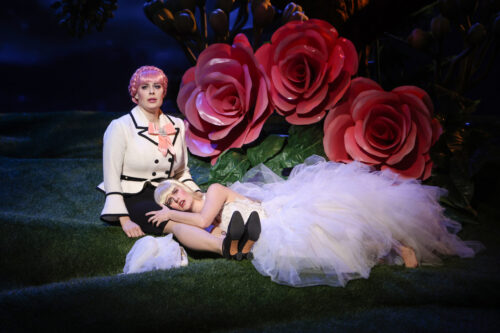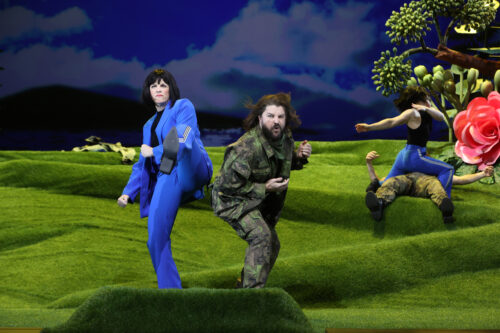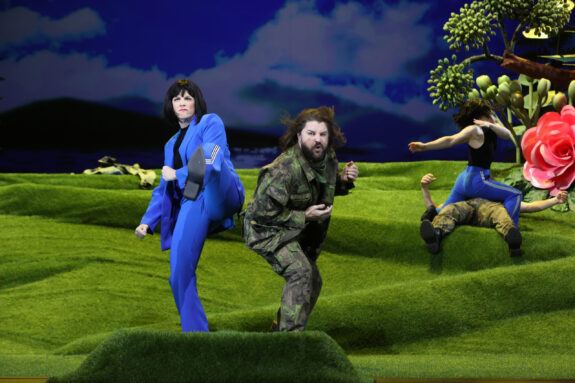 Germany Berlioz, Béatrice et Bénédict: Soloists, Chorus, and Extras of Theater Bremen, Bremer Philharmoniker / Lukas Ziesché (conductor). Theater Bremen, 6.3.2025. (DM-D)
Germany Berlioz, Béatrice et Bénédict: Soloists, Chorus, and Extras of Theater Bremen, Bremer Philharmoniker / Lukas Ziesché (conductor). Theater Bremen, 6.3.2025. (DM-D)

Berlioz’s Béatrice et Bénédict is based on the leading characters in Shakespeare’s Much Ado about Nothing. Berlioz used the main plot line of the play, how Béatrice and Bénédict are led to admit their love to reach other but deleted the sub-plot of the intrigue against Hero and Claudio. Following the convention of opera comique, in Béatrice et Bénédict, spoken dialogue is used instead of recitatives to link the music numbers.
For this production, Nina Maria Metzger rewrote the dialogue to make it more compatible with contemporary concerns. The characters of Béatrice and Bénédict were each cast with an actor and a singer. Director Susanne Lietzow worked with them and choreographer Fabio Toraldo to make the interaction between these four characters come across as natural and witty. At times, actor and singer of the same role interacted with each other, representing different sides of an argument, for example. At other times, Béatrice (actor) interacted with Bénédict (actor), at others Béatrice (actor) interacted with Bénédict (singer) or vice versa. All possible constellations were playfully used. While the singers put in a lot of effort to act the dialogue, the difference between performers trained and working predominantly as actors and those trained and working predominantly as singers was always obvious and the production did not manage to achieve complete balance.
Both in conventional stage plays and in music theatre and opera, so much of the appreciation of comedy depends on the atmosphere in the theatre, the audience’s overall responsiveness, at a given performance. Sadly – particularly so for the performers! – on this occasion, the audience in the slightly more than half-full auditorium was practically inert and not a single laugh was heard during the entire two hours of performance time – though no doubt much of it would have been considered funny elsewhere.
However, the humour was never too direct and not without a sharp edge either. A pensive mood was established during the overture with a video of moving wartime scenes, farewells and welcome backs, projected onto a gauze curtain in front of the stage. As the curtain was raised, these projections gave way to a bold and colourful fairy tale set, which presented a bright green outdoor garden or meadow landscape with slopes and pathways and a large backdrop with beautiful views of the sky at different times of the day with an interplay of sunlight and moonlight. The locals in bright colours differed starkly from the returning soldiers in their battle gear. The military contexts were never forgotten or ignored, even in those colourful surroundings, and prevented fairy tale endings from taking hold. In this production, Hero decided at the altar not to marry Claudio, postponing the wedding until they would have had a chance to get to know each other better; Claudio was happy with this development, even relieved.

The audience did note and appreciate the music, which they would have preferred to hear more of: I overheard a spectator sitting close to me say ‘now they’ll go on talking again for ages, what a waste of time’. The singing was indeed superb. Ulrike Mayer sang Béatrice with considerable gusto, in line with her character. She was clearly at ease with her voice, in full command of subtleties and nuances. On the basis of a full-bodied, sonorous lower register, she allowed the higher range to bloom. Oliver Sewell managed to keep his ringing tenor voice open despite the invitation of the French language to close in and turn narrow and nasal. In line with his character, he came across as sturdy and robust, adding a new note to his range of delivery compared with his recent Rodolfo (review here). As Hero, Elisa Birkenheier exceeded even highest expectations based on a range of earlier minor roles. The voice was well-rounded and balanced all the way to the exposed top, appropriately silvery and crisp. That bright and fresh voice quality was very well contrasted by Nathalie Mittelbach’s golden and velvety voice as Hero’s chaperone, Ursula, in their long duet. Arvid Fagerfjäll as Claudio and Jasin Rammal-Rykała as the General, Don Pedro, were more than adequate in their small roles.
Lukas Zisché demonstrated a keen awareness of the French musical idiom and brought the orchestra to full speed in no time after the long passages of spoken dialogue, thus maintaining tension and interest. Under his baton, the music was particularly carefully attuned to the singers’ needs in terms of volume and tempi, and the orchestra played with a clear sense of enjoyment, relishing the playfulness of the music.
Daniel Meyer-Dinkgräfe
Production:
Director – Susanne Lietzow
Choreography – Fabio Toraldo
Set design – Aurel Lenfert
Costume design – Jasna Bosnjak
Lighting design – Norman Plathe-Narr
Video – Petra Zöpnek
Chorus director – Karl Bernewitz
Dramaturgy – Caroline Scheidegger
Dialogue – Nina Maria Metzger
Cast:
Béatrice – Ulrike Mayer (singer) / Mirjam Rast (actor)
Bénédict – Oliver Sewell (singer) / Christian Freund (actor)
Hero – Elisa Birkenheier
Claudio – Arvid Fagerfjäll
Leonata – Judith Goldberg
Don Pedro – Jasin Rammal-Rykała
Ursula, Hero’s chaperone – Nathalie Mittelbach
